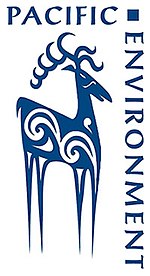Pacific Environment
 |
|
| Founded | 1987, San Francisco, California, United States |
|---|---|
| Focus | Environmentalism |
|
Area served
|
Pacific Rim |
| Method | Lobbying, Funding Grassroots groups, Promoting best Practice, forging coalitions between environmentalist groups |
| Website | Pacific Environment Homepage |
Pacific Environment is an environmental organization based in San Francisco, California, United States, founded in 1987. Its objective is to protect the living environment of the Pacific Rim.
The organization was founded 1987 as Pacific Energy and Resources Center. In 1991, Pacific Environment became the first international organization to bring widespread attention to the threats facing the Siberian taiga, beginning a long history of work in Russia. In 1993, a Pacific Environment campaign with Russian partners led to the creation of the Botchi Nature Reserve, protecting valuable forests in the Russian Far East that were to be logged by Weyerhaeuser Corporation. That same year, Pacific Environment worked with the Udege people in the Russian Far East to protect the three-million-acre (1.2-million-hectare) upper Bikin Watershed against logging by the Hyundai Corporation. This area is now a wildlife refuge.
By the mid-1990s, they began to focus on the linchpin financial role international institutions were playing in resource extraction in Russia and initiated a long-term effort to link grassroots environmentalists around the Pacific Rim to international policy decisions, particularly those of government-supported export credit agencies. Pacific Environment pioneered efforts to block the financing of destructive projects and improve others as one of the founding members of an international campaign to reform the social and environmental policies of export credit agencies, in a program dubbed ECA Watch. While Pacific Environment's biggest successes in the 1990s were in Russia, they also began to focus more broadly on the Pacific Rim.
In China, Pacific Environment took advantage of the growing opportunities to partner with that country's emerging environmental movement by helping dozens of local groups become more effective watchdogs of local government, especially through the media. They also assisted these groups in encouraging the Chinese government to review environmental impacts. Pacific Environment's partners at Greener Beijing utilized the internet to organize a campaign against consumption of turtle and tortoise species in the Hainan Province. After a government investigation prompted in part by the campaign, the Hainan Yang Sheng Tan Company halted its import of turtle and tortoise species after financial losses and public pressure. And in 2004, Chinese Premiere Wen Jiabao ordered officials to reconsider plans for a dam along the Nu River, after journalists and environmentalists teamed up to spotlight the issue.
...
Wikipedia
